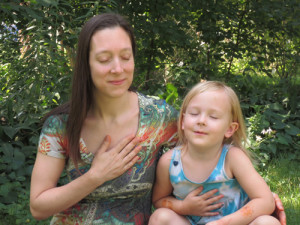Mindfulness for Children: Exercises for Emotional Regulation & Focus
Have you ever had one of those moments where your child is emotionally distraught beyond your ability to soothe (or be present with), you both end up frustrated and you wish you had some way to stop this from happening ever again? Like, really, some way to consistently meet these experiences and at the same time help your child learn to deal with her emotions more skillfully (and maybe you, too)?I hear you. When my oldest (who’s now 14 and counting) was a toddler, I was ill equipped to handle what came from her during moments of emotional turmoil. I just didn’t know what to do, and when I learned what to do I still didn’t have the skills to really make it happen. It was hard, really hard.
When my second child was born, I wasn’t much more skilled, but I knew I didn’t want to repeat some of the mistakes I’d made with my first (punishing, yelling and spanking to name a few). As my son grew into toddlerhood, I was faced with more of the same. And then my third upped the ante. She was literally a screamer from day three.
A lot came to a head for me during those years – and for my kids. Since then I’ve come to realize that none of us had the skills to deal with our emotions in any other way than we were. We were truly doing the best we could. We all needed new skills to meet the challenges of being human. The two skills I continually find to be life changing in this respect, and that help with both emotions and focus, are mindfulness and collaborative problem solving.
What is mindfulness? There are two meanings really. The first is that mindfulness is awareness, an inherent quality we all have or the alive awareness that is the basis of being. Along with this, mindfulness points to non-judgmental or gentle, kind and curious awareness. The second meaning of mindfulness points to techniques that help us recognize and utilize our awareness for various purposes such as emotional regulation, focus, addressing anxiety, achieving goals and enjoying life.
Mindfulness can be immensely helpful for adults – and kids! While I recommend exploring mindfulness on your own, you can also learn along with your child. Below are a few audio exercises that you can start with (right click to save). If you find them helpful, check out Clear Kids – Mindfulness Course for Children.
- Lesson 1 – Mindful Bodies
- Lesson 2 – Mindful Listening
- Lesson 3 – Mindful Breathing
How does mindfulness help with emotional regulation and focus?
When we get upset, we are often reactive – reacting to what we are experiencing. We don’t have much space (internal or external) to respond any differently. Our brains are doing the best they can from a survival perspective. We can learn to create space, though, through mindfulness techniques that help us train ourselves to stop, pause and focus – by choice. When we’re in the heat of the moment, there’s not a lot of room for choice, until we’ve established within ourselves that we actually can choose – even when we experience intense or distracting feelings.
Children often learn what they live, so if we’re reactive, they may be the same. They also have continually growing and changing brains, which seek safety. So, if they’re not feeling safe, they’ll react (i.e. exhibit challenging behaviors, meltdown). It’s almost impossible to focus when kids feel this way. Some kids feel this way a lot of the time. Practicing mindfulness helps children to experience a sense of space and safety within themselves, which strengthens their emotional resilience and ability to focus. This is all a process, and not necessarily a quick fix, but there’s a lot of continuing research which affirms the benefits of mindfulness with children.
Most importantly, sharing mindfulness with kids helps them and us learn alternatives to power struggles, punishment and dysfunctional communication. We trade control for collaboration while sharing life affirming skills. In my book, this is time well spent. I invite you to explore what mindfulness has to offer you and your family and see what happens. You may be pleasantly surprised.
Are you looking for ways to connect meaningfully with your child while sharing valuable life skills? Would you like to support your child in becoming more self-aware and able to regulate emotions (develop the skills to deal with frustration in socially acceptable ways)? Have you heard about the benefits of mindfulness with children and want to learn more in a small group setting with personal support from a seasoned mom (aka meditating mom with five kids between the ages of 2 and 14 who practices mindfulness to continually develop skills of love, patience and collaboration amidst the chaos)?
Clear Kids Mindfulness Course for Children offers you and your child the opportunity to learn mindfulness together in a course designed for kids that’s helpful for adults, too. The course is designed for kids age 5-11, and can be helpful for some younger and older children as well. A course for teens is also in the works.
For related resources, visit the Meditation for Children page.
Amy Phoenix is a gentle yet direct mom of five and facilitator of Presence Parenting, a space to address the presence we bring to parenting, especially when feeling frustration, anger or rage. She is also slowly, but surely authoring Force Free Parenting, a book exploring the nature of force in adult-child relationships while providing viable alternatives.
“Thank you for joining me in some collaborative parenting discussions. Are you struggling as a parent? If so, I’d like to share something invaluable with you:hope. If you would like to change how you respond when parenting feels intense, I invite you to consider this ebook or challenge.”

